5 ch10 Sales 国际商法
- 格式:doc
- 大小:1.43 MB
- 文档页数:20
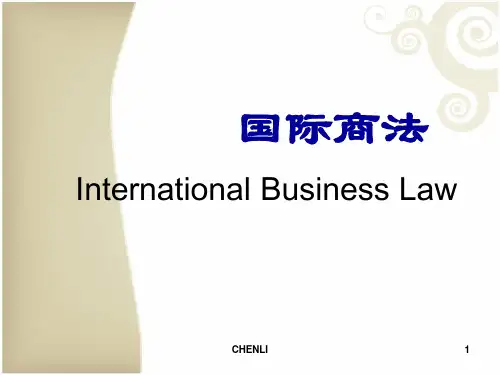

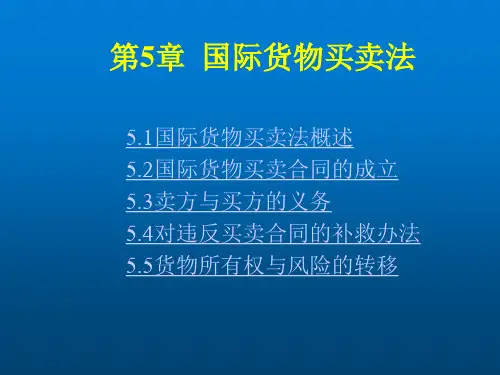

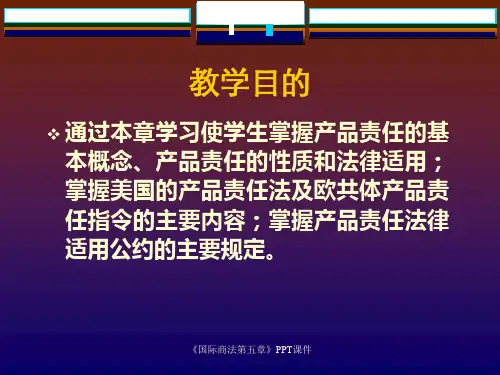
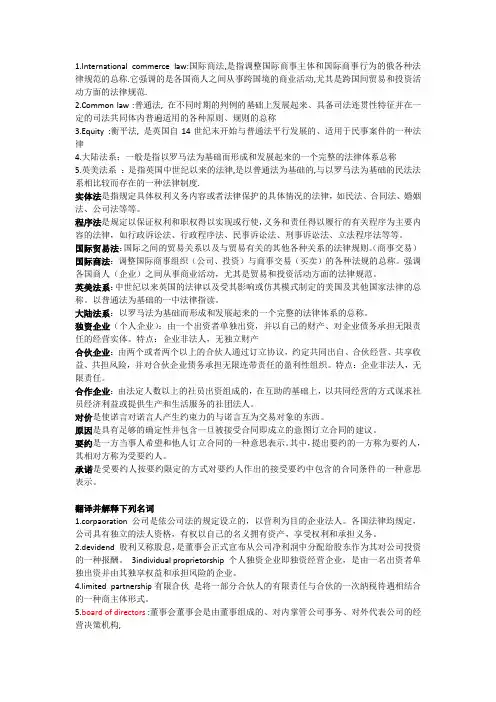
1.International commerce law:国际商法,是指调整国际商事主体和国际商事行为的俄各种法律规范的总称.它强调的是各国商人之间从事跨国境的商业活动,尤其是跨国间贸易和投资活动方面的法律规范.mon law :普通法, 在不同时期的判例的基础上发展起来、具备司法连贯性特征并在一定的司法共同体内普遍适用的各种原则、规则的总称3.Equity :衡平法, 是英国自14世纪末开始与普通法平行发展的、适用于民事案件的一种法律4.大陆法系;一般是指以罗马法为基础而形成和发展起来的一个完整的法律体系总称5.英美法系:是指英国中世纪以来的法律,是以普通法为基础的,与以罗马法为基础的民法法系相比较而存在的一种法律制度.实体法是指规定具体权利义务内容或者法律保护的具体情况的法律,如民法、合同法、婚姻法、公司法等等。
程序法是规定以保证权利和职权得以实现或行使,义务和责任得以履行的有关程序为主要内容的法律,如行政诉讼法、行政程序法、民事诉讼法、刑事诉讼法、立法程序法等等。
国际贸易法:国际之间的贸易关系以及与贸易有关的其他各种关系的法律规则。
(商事交易)国际商法:调整国际商事组织(公司、投资)与商事交易(买卖)的各种法规的总称。
强调各国商人(企业)之间从事商业活动,尤其是贸易和投资活动方面的法律规范。
英美法系:中世纪以来英国的法律以及受其影响或仿其模式制定的美国及其他国家法律的总称。
以普通法为基础的一中法律指读。
大陆法系:以罗马法为基础而形成和发展起来的一个完整的法律体系的总称。
独资企业(个人企业):由一个出资者单独出资,并以自己的财产、对企业债务承担无限责任的经营实体。
特点:企业非法人,无独立财产合伙企业:由两个或者两个以上的合伙人通过订立协议,约定共同出自、合伙经营、共享收益、共担风险,并对合伙企业债务承担无限连带责任的盈利性组织。
特点:企业非法人,无限责任。
合作企业:由法定人数以上的社员出资组成的,在互助的基础上,以共同经营的方式谋求社员经济利益或提供生产和生活服务的社团法人。
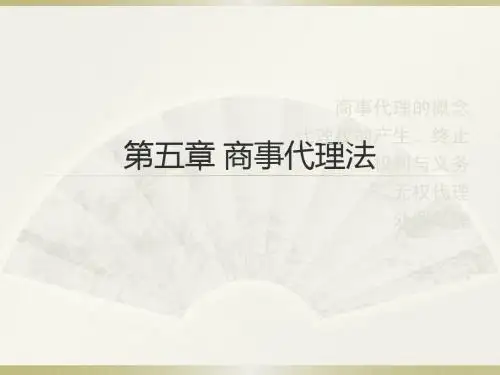
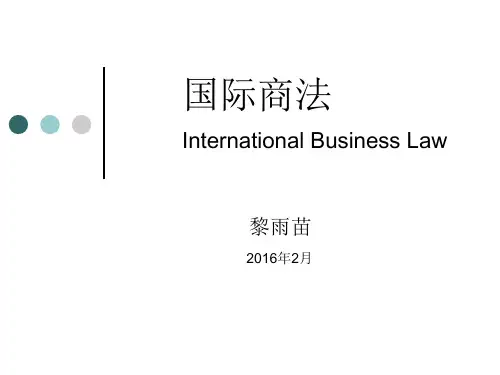

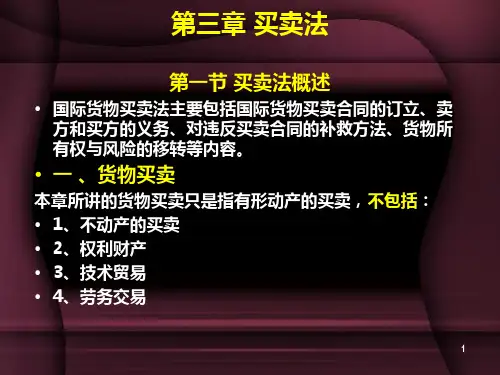
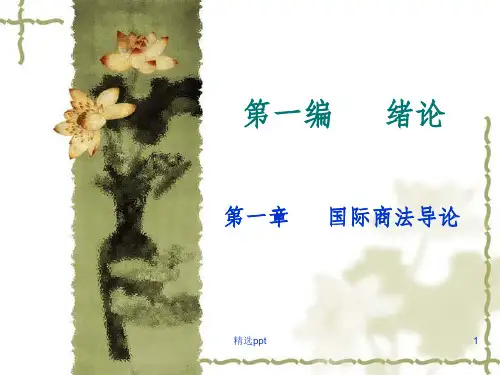
Chapter 10 Outline CO10-1 Chapter 10 - Sales A. UNITED NATIONS CONVENTION ON CONTRACTS FOR THE INTERNATIONAL SALE OF GOODS (CISG) 1. In Effect since January 1, 1988 2. Current State Parties: 71, including the United States
B. TRANSACTIONS COVERED IN CISG 1. CISG Applies to Contracts for the International Sale of Goods a. The sale must be international. 1) The buyer and seller must have their places of business in different states. 2) Additionally, either: a) Both of the states must be contracting parties to the convention, or b) The rules of private international law must lead to the application of the law of a Contracting State. 1] Note: CISG may apply even if the buyer’s and seller’s places of business are not in a contracting state. 2] Exception: The final provisions of the Convention allow a ratifying state, if it wishes, to declare that it will apply the CISG only when the buyer and seller are both from contracting states. 2. Opting In and Out a. The parties to a contract may exclude or modify the CISG’s application by a “choice of law” clause. b. Whether parties can exclude a domestic law and adopt the CISG in its place depends on the rules of the state where the case is heard.
Case 10-1. Asante Technologies, Inc. v. PMC-Sierra, Inc. Chapter 10 Outline
CO10-2 3. Sale Defined a. CISG does not directly define a sale. b. Implied definition: The delivery of the goods and their supporting documentation by the seller and the payment of their price by the buyer. 1) Compare the US UCC: the passing of title from the seller to the buyer for a price. 4. Goods Defined a. CISG does not directly define goods. 1) The drafters assumed that the CISG only applies to goods that are movable and tangible. a) This is in accord with international usage. b. CISG list the sales and goods that are excluded from its coverage. 1) Sales transactions that are excluded: a) Goods bought for personal, family or household use. 1] This exclusion does not apply unless the seller knew or ought to have known that the goods were bought for personal use or consumption. b) Auction sales. c) Sales on execution or otherwise by authority of law. 2) Goods that are excluded: a) Stocks, shares, investment securities, negotiable instruments or money. 1] Note: Many similar goods are not excluded (e.g., patents, copyrights, and trademarks). b) Ships, vessels, hovercraft or aircraft. c) Electricity. 5. Mixed Sales a. Mixed sales and services contracts are treated by the CISG as sales of goods, unless “the preponderant part of the obligations” of the seller “consists in the supply of labor or other services.” 1) Preponderant probably means more than half. 2) Whether this is measured by the cost, the sale price, or by some other basis is not clear. Chapter 10 Outline CO10-3 b. Contracts for goods to be manufactured are sales unless the buyer undertakes to supply a substantial part of the materials. 1) Substantial is probably less than half.
C. CONTRACTUAL ISSUES EXCLUDED FROM THE COVERAGE OF THE CONVENTION 1. The CISG Only Deals With: a. The formation of contracts. b. The remedies available to the buyer and seller. 2. The CISG Specifically Excludes Questions About: a. The legality of the contract. b. The competency of the parties. c. The rights of third parties. d. Liability for death or personal injury. 3. Preemption: When the CISG applies, domestic law is preempted. a. Reason: the CISG’s basic function is to establish uniform rules for international sales contracts. b. Scope of the CISG. 1) CISG applies to contractual issues. a) CISG preempts the local law even if the local law gives a different name to a particular remedy. b) CISG preempts the local law even if the local law adds additional elements to a matter that is contractual in nature.
D. INTERPRETING THE CONVENTION 1. Interpreting the Provisions of the CISG a. Apply the following basic principle: The goal of the CISG is the creation of a uniform body of international commercial sales law. b. Consider the following sources, in the following order: 1) The Convention. 2) The general principles on which the Convention is based. 3) The rules of private international law.